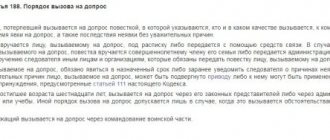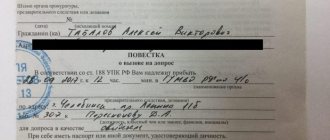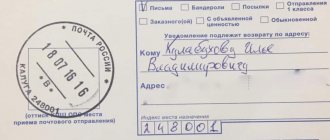Interrogation involves obtaining information regarding a criminal event from the persons summoned and recording it in the protocol. The basis for the summons is the knowledge of the interrogated about certain circumstances of the incident. This fact can be established during operational search activities. The calling procedure is established by Art. 188 Code of Criminal Procedure.
Who can be summoned for questioning
Any person who has information about a crime committed is subject to interrogation, unless this contradicts the Code. The victim and the suspect (accused) are interrogated without fail, since this is also necessary to protect their rights. We will tell you more about the procedure for interrogating a victim under the Code of Criminal Procedure of the Russian Federation in a separate article here. In addition, the summons can be sent:
- to the witness;
- understood;
- to an expert;
- translator;
- to the investigator;
- to the investigator.
Persons with mental illness or physical disabilities may also be called upon to testify if they are able to adequately assess the situation and express their thoughts.
The summons form for questioning is available at this link
Commitment
Responsibility for failure to appear in response to a summons to the investigator will only occur if the person was properly notified of the upcoming procedural conversation. Even if a person received this document in his hands, but did not put his signature on another copy, which is returned to law enforcement agencies, this will also mean that the citizen knew about the upcoming interrogation. In this case, the investigator may impose an obligation to appear on such a person. It will consist in the fact that a citizen must come to law enforcement agencies upon the first call from an employee. Otherwise, preventive measures may be applied to him.
Moreover, this obligation applies not only to suspects and accused persons, but also to witnesses and victims. By signing such a document, a citizen assumes certain functions, which consist, first of all, of reporting a change of residence to the investigator and appearing upon his first call. Of course, this is already an extreme measure of procedural coercion. It is used only if the law enforcement officer is not sure that the person will independently appear for questioning. Therefore, having received a document such as a subpoena, the witness must arrive at the specified time to give evidence to the body indicated in it.
Persons not subject to interrogation
According to Art. 56 of the Code of Criminal Procedure, witness testimony cannot be demanded from the following persons who received information about a crime in the performance of official duties:
- Judge, juror, arbitrator (arbiter).
- The lawyer of the suspect (accused) or other person who has applied for legal assistance and provided information regarding the case under investigation. The exception is cases when the lawyer himself requests interrogation in the interests of his client and with his consent (or the consent of another person).
- President of the Russian Federation.
- A member of the Federation Council, a State Duma deputy, unless they express their consent.
- Diplomat.
- Commissioner for Human Rights in the Russian Federation.
- Inspector of the Tax Service.
- Priest.
The procedure for questioning a witness under the Code of Criminal Procedure of the Russian Federation, as well as an example of an interrogation protocol can be found in a separate article https://lexconsult.online/6832-poryadok-doprosa-svidetelya-po-upk-rf
Witness immunity also applies to:
- a suspect who has the right to refuse to provide information discrediting him;
- close relatives of the defendant.
If these persons are nevertheless summoned for questioning, they must appear at the place of demand and present documents confirming their immunity.
Receipt
According to Art.
188 of the Code of Criminal Procedure, a witness to an atrocity or a victim is summoned for a procedural conversation with the investigator only by a summons. In this case, the person must be given this document in person and against signature. Otherwise, in the future the citizen may simply not appear for questioning, justifying this fact by the fact that he was not properly notified. In this case, he will be absolutely right. In addition, if the person to whom the summons must be served is temporarily absent, then it can be handed over to one of the adult members of his family against signature. This document is also presented through the administration of the place of work or study. In the latter case, this applies only to those individuals who are under 16 years of age. In addition, these minors are summoned for a procedural conversation through their legal representatives. If the person was properly notified of the invitation to interrogation, then failure to appear in response to the summons to the investigator can have very unpleasant consequences, including arrest and the imposition of a monetary penalty.
Agenda information
The summons must contain the following information:
- Recipient's name and address;
- purpose of the call;
- Full name of the investigator;
- address of the institution and room number where the interrogation will take place;
- date and time of appearance at interrogation;
- measures taken against the summoned person in case of failure to appear.
A sample summons for questioning can be downloaded here
Methods of transmitting notice
A notice of summons for interrogation is delivered to the addressee’s place of residence and handed to him personally. In his temporary absence, the summons is transmitted to:
Helpful information
In order to assist the investigation and protect your rights, you need to know how to behave during interrogation. You need to be confident and refuse to give evidence if you do not remember it in whole or in part. If you are not given a protocol to sign, it is not valid. You can find out more tips in the article here
- a close relative who has reached the age of majority;
- to an administrative employee at the place of work;
- to other persons (organizations) on behalf of the investigator.
A receipt is taken from the recipient, which indicates the date and time of transmission of the notice. Temporary absence means the intended return of the addressee within 24 hours or within a period sufficient for a timely visit to the place of interrogation. Also, the summons can be sent by mail, telephone, via the Internet and other means of communication with the obligatory indication of details. A summons for questioning by telephone without a summons cannot be considered lawful.
Subpoena delivery on behalf of the investigator
The legislation does not establish the form of instructions sent to third parties to transfer the subpoena to its destination. It is still better if it is in writing. The order can be entered directly into the text of the agenda in a separate column. It is also not required to accompany it with the issuance of a corresponding resolution. However, the need for this may arise when certain powers are transferred to other investigative bodies.
Special procedure for calling for interrogation
In relation to some persons, separate rules for serving a summons apply:
note
It is important to distinguish between the concepts of interrogation and interrogation. The main difference is that the materials used during the survey cannot be used as evidence.
- Persons under 16 years of age are summoned for questioning through:
- parents (guardians);
- management of the educational institution;
- administration at the place of work.
- Those in custody and serving time in places of deprivation of liberty are notified of the summons by the administration of the correctional institution.
- Military personnel are notified by the head of the military unit.
- Persons located abroad may be called upon to testify only with their consent. They are not subject to criminal or other prosecution for 15 days from the moment when the investigative need for their presence has ended.
- Those detained outside the Russian Federation are transferred for questioning by an official of a foreign state in accordance with international agreements.
Calling the investigator by phone
Investigators often call witnesses by telephone. In this case, citizens have a reasonable question about the need to come to the official.
The current law provides that a subpoena is served on the person summoned for questioning against a signature or transmitted via communications.
Thus, calling the investigator using a telephone is permitted.
In this case, during a telephone conversation, the investigator is obliged to introduce himself, inform whom, when, at what address and in what capacity the person is being called, and also inform about the consequences of failure to appear without good reason.
Based on the results of the telephone call, the investigator (inquirer) draws up a telephone message about calling the witness, which indicates the day the telephone call was made, the telephone number of the subscription, the time of the call and the procedural action.
Failure to appear for questioning
To a person who failed to appear and received a summons for questioning, Criminal Procedure Code Art. 111 provides for the use of criminal procedural compulsory measures:
- In relation to the suspect (accused):
- imposing an obligation to visit the investigator;
- drive unit;
- deprivation of official powers for a certain period;
- property seizure.
- In relation to other persons:
- obligation to appear at interrogation;
- drive unit;
- collection of a fine imposed exclusively by the court.
It is possible to use several measures simultaneously, as well as their combination with preventive measures.
Valid reasons for absence
If you are unable to appear for questioning for good reason, you must notify the investigator in advance, orally or in writing. According to lawyers, it is better to use both options. Based on cases from judicial practice, the following reasons for failure to appear can be considered valid:
- receiving notice after the date when you should have appeared for questioning;
- travel difficulties due to poor road conditions;
- a traffic accident that occurred while traveling to your destination;
- assignment on an urgent business trip;
- the presence of small children who have no one to leave with;
- illness of the person being called or his relatives;
- disaster.
A valid reason for failure to appear for questioning by the investigator is determined by the official. If the decision is positive, the callee is not subject to forced delivery, but receives a repeat call scheduled for another date.
Drive unit
Drive means the forced delivery of a person summoned to the investigative department, prosecutor's office or court. The procedure for its implementation is regulated by Art. 113 Code of Criminal Procedure. Even a single failure to appear when called can serve as a reason for applying this criminal procedural measure.
Drive procedure
This criminal procedural measure is applied on the basis of:
- A decision made by an inquiry officer, investigator, prosecutor or judge. The order issued by them is carried out by a police officer.
- A court ruling executed by a bailiff.
The resolution (definition) is read to the person being delivered, who confirms this fact with his signature. After which he is invited to voluntarily proceed to the place of interrogation, accompanied by a police officer or bailiff. Direct physical force is used in case of evasion of demands, resistance or attempt to hide from the performers.
Forced delivery without warning
A summons not preceded by a summons applies only to the suspect (accused):
- having no fixed place of residence;
- hiding from investigation.
This refers to cases where there are no sufficient grounds to detain the wanted person or take him into custody.
Review the list of possible questions
Armed with Appendix No. 1 to the Methodological Recommendations of the Investigative Committee and the Federal Tax Service (letter of the Federal Tax Service dated July 13, 2017 No. ED-4-2 / [email protected] ), it is necessary to carefully prepare for the interrogation.
This appendix contains two lists of questions: for the general director and for an ordinary employee.
A total of 80 questions recommended for use by all inspectorates during interrogations.
Speak out the answers to the questions, because sometimes to hear the “absurdity” of an argument or hear the “double meaning”, you just need to say the phrase out loud.
Arbitrage practice
In 2022, a trial took place in the Chechen Republic to bring to administrative responsibility a citizen of the Russian Federation who deliberately failed to comply with the legal requirements of the investigator by failing to appear at the court hearing to give testimony.
After considering the case, the court ruled:
- Find a citizen guilty of an offense under Art. 17.7 Code of Administrative Offenses of the Russian Federation.
- Punish him in the form of an administrative fine in the amount of one thousand rubles.
In criminal proceedings, this article does not aggravate the punishment and is not a reason to initiate legal proceedings. But if the requirements of Art. 188 of the Code of Criminal Procedure of the Russian Federation, the testimony of a witness is not accepted in court.










